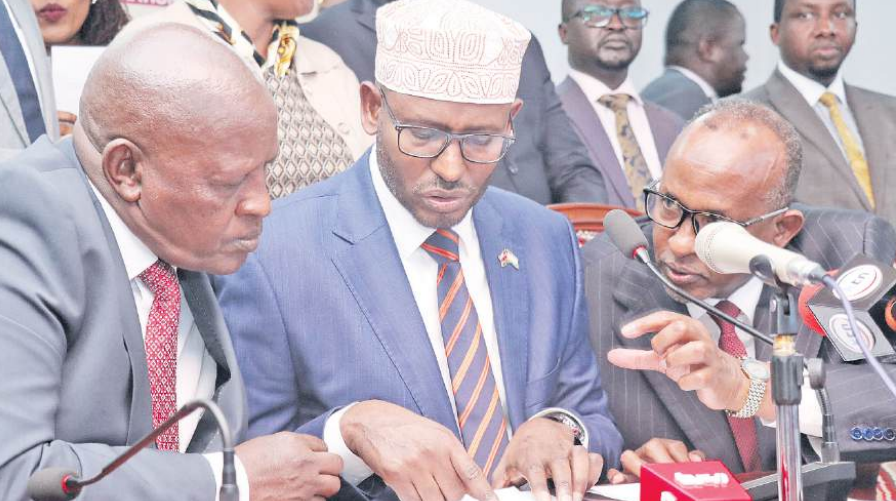
The national and county governments have started identifying poor Kenyans eligible for state support to access free medical services through the Social Health Insurance Fund.
The ministries of Health and Labour, along with the county governments, are working together to identify those who require support.
Health Cabinet Secretary Aden Duale and the Council of Governors, led by vice chairperson Mutahi Kahiga (Nyeri), announced the development on Thursday.
“The indigents to be identified by the Ministry of Health, Council of Governors and the state department of social protection and paid for jointly by the two levels of governments,” Duale and Kahiga said in a joint statement.
The two released the statement after a daylong meeting where they discussed teething challenges in the health sector, including the implementation of SHIF under the Social Health Authority.
The parties said that the Health ministry would publish standardised guidelines for the payment of the vulnerable Kenyans by Monday next week.
This would enable counties to factor in their annual work plans and budgets for the upcoming financial year.
“We have an immense responsibility on our shoulders which requires wide consultations, collaborations and partnerships for us to meet our common objective of delivering quality, affordable and accessible healthcare to every Kenyan,” they said.
The development cements President William Ruto’s previous pronouncements that the government would pay monthly premiums for poor Kenyans.
“We will also know if you are able to pay, and if you are not, the government will cater for your expenses," the President said in November.
He said that the defunct National Health Insurance Fund denied many Kenyans fair access to medical services, adding that the scheme only favoured the financially able and ostracised the impoverished.
“We have had problems with NHIF and it has a pending debt of Sh30 billion because the services they provided costed more than the money accessed through that programme,” the head of state added.
Currently, the government is deducting 2.75 per cent from salaried Kenyans to go towards SHA.
Previously, under the NHIF, Kenyans contributed between Sh500 and Sh1,700 monthly and between Sh6,000 and Sh20,400 annually for the least earning and highest contributors, respectively.
Currently, close to 22 million Kenyans have registered with SHA, with a paltry six million paying the premiums.
The development raised concerns about the sustainability of the new health programme, whose rollout has been controversial.
On the rollout of the new digital health system, Duale and the county bosses agreed to facilitate the signing of the necessary agreement to pave the way for the implementation.
“The governors, through the coordination of the Council of Governors Secretariat, will expedite the process of signing the finalised intergovernmental participatory agreements to give way for the implementation of provisions under the digitisation agenda,” they said.
He said that the Digital Health system would enable any person, as long as the person is registered, to walk into any facility and be treated.
“Kenyans will not carry any file or a card to be treated. Once you are registered, you will walk into any health facility, whether it is a public hospital, private, or faith-based and get treated,” Duale told MPs on Tuesday.






![[PHOTOS] Guardian Angel bus catches fire in Kikuyu](/_next/image?url=https%3A%2F%2Fcdn.radioafrica.digital%2Fimage%2F2025%2F04%2F58287f0a-f201-4a78-87f0-6f147ad8ba8a.jpg&w=3840&q=100)




